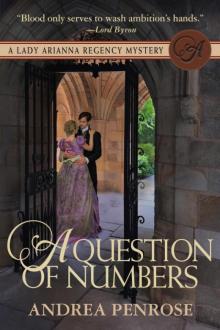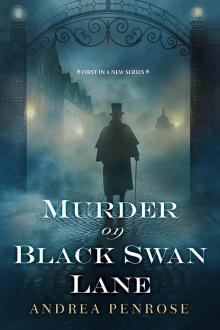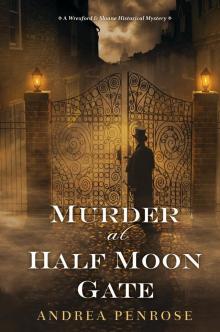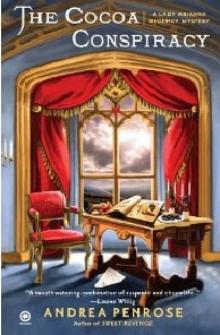- Home
- Andrea Penrose
A Question of Numbers Page 2
A Question of Numbers Read online
Page 2
His words jarred her back to the moment. “As did the killer.” She explained what she had heard. “Grunwald also said a name—Andronovich. Does that mean anything to you?”
He shook his head. “No, but I haven’t been following the political negotiations.”
As he slipped away, Arianna watched the shadows tangle with shadows, their dipping, darting shapes moving too quickly for the eye to discern. And all at once, the soft swish of the leaves took on a more menacing rustle.
And to think that Saybrook and I had imagined a summer of quiet contemplation.
“Damnation,” she whispered. “It seems there will be no peace in our lives while Napoleon’s arse is perched on a throne.”
Chapter 3
“You aren’t dressed for riding,” observed Sophia Kirtland as she entered the morning room, a damp chill clinging to her skirts as dawn’s light had not yet dispelled the night’s shadows. “I take it, you’ve forgotten the lesson we scheduled.” A pause. “Or are pretending to have done so.”
Having spent most of her early life in the West Indies, Arianna was more at home on a sailing vessel than the back of a horse. She was making an effort to master the rudiments of saddle and spur—but she made no bones about the fact that she didn’t enjoy being bounced around atop a large, smelly beast.
“I’m so sorry.” Arianna gave an apologetic wince and poured out a second cup from the pot of piping hot chocolate that had just been delivered from the kitchen. “I did forget.” She held back a yawn, suddenly aware that she had yet to catch a wink of sleep. “I’m afraid our evening’s engagement stretched on longer than we expected.”
Sophia accepted the chocolate and blew away the plume of steam before taking a sip. “Please don’t tell me someone else has tried to murder you.”
“It’s been at least a month since the last attempt,” quipped Arianna. “I swear, I don’t go looking for trouble—”
“And yet it seems to find you,” interjected her friend.
Alas, that is true.
“A dead body does come into play,” said Saybrook as he joined them. He looked tired and disheveled from having spent the night at Henning’s surgery while their friend examined Grunwald’s corpse. “Though it’s not entirely Arianna’s fault. My uncle requested that we do him a small favor.”
“As you see,” she murmured. “No good deed goes unpunished.”
Sophia choked on a laugh.
“I do, however, take umbrage at the ‘not entirely’ part of your statement,” added Arianna. “I really don’t see how I bear any blame for Count Grunwald’s demise.”
“You challenged Napoleon—and beat him in a match of wits,” replied the earl. “He’s not used to losing, and I daresay defeat doesn’t taste nearly as sweet as your chocolate confections—”
“Who is dead and how does it involve the Emperor?” exclaimed Sophie in alarm. She knew all about their recent adventure in Elba. “Are you saying Napoleon is out for revenge against Arianna?”
“In the grander scheme of things, I think he has bigger fish to fry,” quipped Arianna, and then released a heavy sigh. “It seems there may be a conspiracy afoot to keep the European powers from uniting in a military alliance to defeat Napoleon’s newly-mustered army and force him back into exile . . .” She went on to explain about the secret message to Mellon and finding Count Grunwald foully murdered in the garden.
“Ye gods.” Sophia frowned in thought. “But isn’t there a British army—reinforced by the Dutch and Belgian troops under the Prince of Orange—stationed near Brussels, with the Duke of Wellington on his way to take command of it? As well as a Prussian army headed by General Blücher? I was under the impression that the threat of war against such a powerful force would convince the French people to abandon Napoleon and allow their rightful King to return to his throne.”
“I wish that were so,” responded Saybrook. “The trouble is, even without the specter of a conspiracy within our ranks, the alliance is in danger of unraveling. After Napoleon was exiled to Elba last year, the other powers-that-be in Europe all began looking at how they might profit from the collapse of his empire.
“I confess, after Napoleon was exiled to Elba, I assumed Europe was finally at peace, so I ceased paying attention to the politics,” said Sophia. “Are things so really fraught that they won’t immediately unite to prevent him from plunging the Continent back into war?”
“The answer is yes,” answered the earl. “I shall try to explain it in a nutshell.” He took a moment to compose his thoughts. “Russia, Prussia and Austria each wish to be the dominant country in Europe, with all the others bowing to their wishes. At present, there is some very Byzantine scheming going on between the three countries.”
He made a face. “I won’t bore you with the complexities. Suffice it to say that Britain is engaging in some very delicate secret negotiations between the three countries to try to broker a compromise. However, if the King of Prussia learns of the details of our talks with Russia and Austria, and thinks that Austria might renege on certain promises, he will likely be furious and refuse to be part of the military alliance.”
Sophia frowned. “But that would be—”
“Disastrous,” finished Saybrook. The Prussian army is currently quartered near Brussels, close to our own Anglo-Allied forces, and it’s the key to Wellington’s chances of defeating Napoleon if the emperor decides to seize the offensive.”
Arianna swore under her breath. She was heartily sick of the Continent’s three dominant rulers and their selfish vanity and greed.
“But . . .” Sophia looked troubled. “But Wellington is a brilliant general, as he proved time and again in the Peninsular War. And haven’t our British troops proved their mettle?”
“They have,” agreed the earl. “But the fact is, most of our veteran regiments were sent to North America to deal with our conflict with the Americans that began in 1812 and just officially ended in December. It will take months and months before we can even begin to organize bringing them back. And until recently the Dutch and Belgian forces now commanded by the Prince of Orange fought under Napoleon’s banner, so their loyalty is suspect. However brilliant, Wellington can’t beat the French on his own. And it will take weeks for Russia and Austria to mobilize their armies and march them to reinforce him.”
He hesitated. “Assuming they show up at all.”
A grim silence took hold of the room. Arianna stared into the dregs of her chocolate. The whole situation had a darkly menacing feel to it. And yet, she refused to believe that her past personal skirmish with Napoleon had anything to do with the fate of nations . . .
Looking up at her husband, she asked, “Did Charles tell you whether his informant—I suppose we must assume it was Grunwald—passed on any other information?”
“Charles explained as much as he knows,” replied Saybrook. “As I said, he’s been engaged in private negotiations with Austria and Russia to settle the quarrel between their two countries. But the informant, who implied he was a member of the Prussian delegation, warned that a high-ranking Russian official was secretly passing on the private details of the negotiations with Austria to the Prussians.”
The mention of Russians set a chill snaking down Arianna’s spine. Tsar Alexander was a personal friend—though given his mercurial temperament, that could change in a flash. However, there were several members of the Russian Court who would dearly love to cut out her liver with a very dull blade.
“That would indeed make Prussia feel Britain and the other are conspiring behind its back,” she remarked. “Making the Prussian king angry enough to refuse to join an alliance against Napoleon.”
“The Prussian army near Brussels is key to the alliance. Without its support, Britain can’t beat the French,” replied Saybrook. “So yes, that seems the obvious objective.”
“But you don’t think the correct one?” questioned Sophia.
The earl didn’t answer right away. Arianna took one of the still-warm su
ltana muffins from the plate of pastries and broke off a morsel. She suddenly realized she was famished.
“Napoleon is the master of feints and diversions,” he finally said, after waving off an offer of food. “I think it would be foolhardy to make any presumptions until we know more.”
“We don’t know for sure that the Emperor has anything to do with the count’s murder,” countered Arianna.
“Not yet, but I imagine Grentham will be frothing at the mouth to elaborate on the connection.” Saybrook consulted his pocketwatch. “He should be arriving at any moment.”
Sophia set down her cup. “Grentham is coming here?”
“Yes. As is Charles,” he said. “And my great aunt. The minister thought it imperative that we have one of our jolly little councils of war. And this is one of the rare times I agree with him.”
“Constantina is accompanying Charles?” Arianna’s initial surprise gave way to a grudging smile. “That’s actually exceedingly clever of you to have her attend.”
“How so?” demanded Sophia. “I thought you preferred to keep her at an arm’s length from skulduggery.”
“In this case, she’s already up to her lovely diamond earbobs in intrigue,” she replied. “If you recall, her dear friend”— Arianna refrained from using a more intimate word—“Gerard Dampierre is a French diplomat here in London. Though his official position is now in question, given that Napoleon has re-seized the throne and forced the French King to flee, he’s likely aware of all the machinations going on among the French factions.”
“And we can’t forget that Dampierre once sided with Napoleon,” pointed out Saybrook, “so he may be even more involved than we know.”
“If he is, I expect to know about it shortly . . .” A gruff voice cut in from just outside the doorway. “My operatives are looking into his activities, and they have orders to do it quite thoroughly.” A dark-as-Hades figure entered the room—black hat, black coat, black boots . . .
And a black scowl, noted Arianna. Lord Grentham looked even more forbidding than usual.
Her suspicion that all Hell was about to break loose was exacerbated by his rumpled cravat and graceless movements in crossing the carpet. It was unlike him to show any chink in his elegant armor.
“Would you care for chocolate, milord? Or shall I ring for a pot of coffee?” she asked.
Grentham rubbed at his unshaven jaw and squinted at the windows, even though a squall of stormclouds had darkened the morning to a twilight gray. As yet, only a light mist was falling, but the sky looked ready to erupt in thunder and lightning at any moment.
“The weather is turning dirty,” murmured Saybrook as a gust rattled the glass panes “The minister might prefer brandy.”
“Coffee would be welcome,” replied Grentham. He, too, looked as if he hadn’t slept all night.
“Wouldn’t you like to take off your coat, sir?” suggested Sophia, her eyes narrowing in a critical stare.
“No,” he replied curtly. “I don’t plan on staying long.” He did, however, remove his hat and slap it against his thigh, sending a spray of droplets over the Aubusson carpet.
A footman brought in the coffee. Grentham took a seat at the table—rather stiffly, noted Arianna—and braced an elbow on the table as he poured himself a cup.
She refrained from a tart comment about the lapse in his usually faultless manners. Up close, she saw his face was gray with fatigue. “Thank you, Thomas,” she murmured to the servant. “Will you also ask Cook to make up a platter of shirred eggs, gammon and toast for Lord Grentham.”
“I don’t need food, I need information,” muttered Grentham, spearing a look at the earl.
“Henning’s report on the body revealed no sign of a struggle,” said Saybrook. “So Grunwald was likely taken by surprise. Other than that, the corpse told him nothing we didn’t already know—that a ten-inch steel blade shoved between a man’s ribs can send him to his Maker rather quickly.”
Sophia paled.
Grentham’s mouth tightened for an instant as he twitched at his cuff. “I hope you discovered something more illuminating than that.”
Saybrook reached for his pocket, then stopped abruptly on hearing Sophia’s sharp intake of breath.
“Good God—is that blood dripping down your wrist, sir?”
“A small scratch,” muttered Grentham, but Sophia was already out of her chair.
“Why, your sleeve is slashed,” she exclaimed.
Arianna shot up to see for herself. Both Grentham’s coat and shirt looked as if it had been sliced by a razor. Beneath the torn fabric she could see a nasty gash in his arm. “Take off your coat,” she ordered.
The minister tried to fend her off. “Stop fussing like mother hens.”
“Don’t be an arse,” snapped Arianna. “That wound needs to be cleaned and bandaged.”
“You might as well surrender with good grace. This is a battle you won’t win,” counseled the earl, a smile touching his lips. “You’re outflanked and outgunned.”
Grentham shot him a daggered look, but ceased his protests and grudgingly removed his coat.
“Kindly escort the minister to the kitchen while I fetch my medical supplies,” ordered Arianna. “We’ll need hot water and sponges.”
“Quite right, I’d prefer to avoid any bloodstains here,” murmured Saybrook. “It’s a very expensive carpet.”
With a wordless growl, Grentham allowed himself to be led away.
Arianna gathered the necessary items from the stillroom—an easy task, she thought wryly, as she and her husband were no strangers to violence—and quickly rejoined the others.
“Remove your shirt, milord,” she said. “I’ve brought a clean one for you to put on, once I’ve finished.”
Grentham flushed, and darted a glance at Sophia. “Absolutely not. Just get on with it,” he said through gritted teeth.
“Oh, for heaven’s sake, don’t be so missish,” said Sophia. “Arianna and I have seen a man’s bare chest before. We won’t fall into a dead swoon.”
“Some men can be shy of uncovering themselves, feeling they don’t show to advantage,” murmured Arianna.
The earl cleared his throat to cover a chuckle.
“And as a practicality, I’d prefer you remove it, so it’s easier to make sure no scrap of linen remains in the wound to cause putrefaction,” she added. “But the choice is yours.”
Grentham unknotted his cravat, then tugged off the ruined garment and tossed it on the floor. “Kindly be quick about it. I’ve no time to waste on puerile jests.”
Saybrook’s expression turned serious. It was clear the gash had been made by a very sharp blade. “How the devil did this happen?” he demanded as Arianna set to tending the minister’s wound.
“I had an earlier meeting in Hyde Park. I chose to send my carriage back to Whitehall Street and come here on foot.”
“Not overly wise, seeing as a deadly assassin is here in London,” commented Saybrook.
“Assassins don’t usually choose me as a target,” said Grentham.
“If Napoleon is behind all the intrigue, the stakes are having a second chance at conquering the world,” replied the earl. “Thus if I were him, I would be willing to take extreme measures. So I suggest that you exercise greater caution for now.”
Grentham’s mouth twitched, but too quickly for Arianna to tell whether it had been a smile. “I’m touched by your concern.”
“It’s purely pragmatic. My wife and went through great effort to keep Napoleon from plunging the Continent back into war. I should hate to see it all go for naught.”
“H-how did you evade the attack?” asked Sophia, whose gaze had remained riveted on the minister’s injured forearm.
“I’m not without some rudimentary skills in self-defense,” he answered softly.
As Arianna began cleaning the lacerated flesh, she watched the flickers of lamplight play over the chiseled contours of Grentham’s shoulders and torso.
Interestin
g. Yet another unexpected discovery about the minister—stripped of his faultlessly tailored finery, he certainly didn’t have the look of someone who spent all of his time behind a desk.
A discreet knock on the door interrupted any further exchange. “I beg your pardon, milord,” said the butler. “Lord Mellon and Lady Sterling have arrived.” A cough. “Your great aunt has a gentleman with her.”
“Please show them to the drawing room,” replied the earl, “and inform them that we’ll be with them shortly.”
Though the gash was ugly, Arianna decided no stitches were necessary. “Forgive me, but this may hurt,” she warned. After cleaning the wound with a splash of Spanish brandy, she sprinkled it with basilicum powder and began to wind a length of bandage around his arm.
To his credit, Grentham suffered the ordeal without a flinch.
“I would guess that Constantina’s companion is Dampierre,” said Saybrook, once she had finished fastening the wrapping in place. “Which makes some sense, as we may have questions about the loyalties of the various French factions that she can’t answer. However . . .”
He looked to Grentham, who pursed his lips in thought.
“Despite her huffing and puffing, the Dragon can be trusted to keep secrets, especially ones that involve her family,” allowed the minister. “But I prefer that no one else know of my visits here. So I won’t join you in the drawing room.”
The earl nodded. “I assumed as much.”
“And yet, Dampierre understands the nuances of French politics, and likely can provide vital information on who can and can’t be trusted,” pointed out Arianna. “Surely it’s important for you to hear his thoughts on the murder. And no doubt you’ll have questions you wish to ask.”
“If I feel the need to do so, I can arrange a meeting with Monsieur Dampierre on my own,” said Grentham.
“Yes, but it seems to me he’ll be far more forthcoming at this meeting.”
Their eyes met. “And why is that?”
“First of all, because Constantina won’t allow him to prevaricate. They are quite close, and he won’t want to disappoint her.”

 A Question of Numbers
A Question of Numbers Murder at Queen's Landing
Murder at Queen's Landing Murder on Black Swan Lane
Murder on Black Swan Lane Sweet Revenge
Sweet Revenge The Cocoa Conspiracy
The Cocoa Conspiracy Smoke & Lies
Smoke & Lies Murder at Half Moon Gate
Murder at Half Moon Gate The Stolen Letters
The Stolen Letters Sweet Revenge lahm-1
Sweet Revenge lahm-1 The Cocoa Conspiracy lahm-2
The Cocoa Conspiracy lahm-2